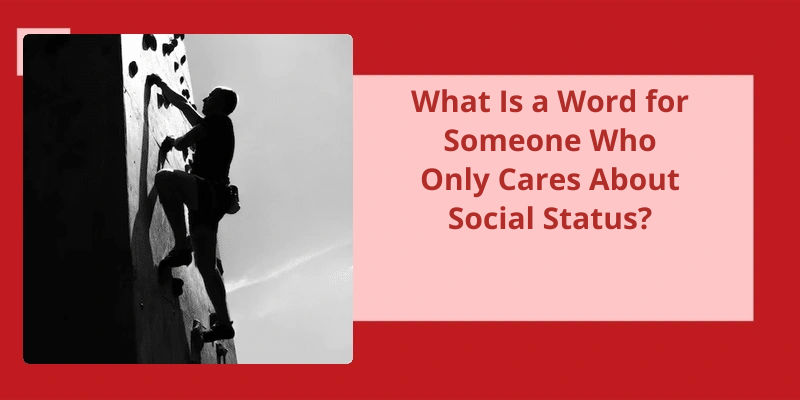Humans have always been concerned about their social standing, at times to the point of obsession. From kings and queens to commoners, everyone wants to be accepted and respected by their peers. However, some individuals take this need for social status to an extreme level. They become snobs, individuals who obsessively pursue high social position and look down on those they deem inferior. Snobbery is a universal phenomenon, seen across cultures and classes. Yet, despite it’s prevalence, snobbery is often viewed negatively, as it involves the conscious rejection of others and prioritizes materialism and superficial qualities over genuine connections and relationships. In this context, identifying someone as a snob may not necessarily be an insult, but rather a recognition of their misplaced priorities and values.
What Do You Call a Person Who Doesn T Care About Social Issues?
A person who doesn’t care about social issues is often referred to as an apathetic person. They’re indifferent to the problems that affect society and show no empathy or concern towards these issues. An apathetic person may not actively participate in any social or political movements, as they don’t feel the need to make a change or contribute towards social progress.
This kind of attitude often stems from a lack of awareness or understanding of social issues and their impact on the wider society. A person who hasn’t been exposed to the realities of social injustice or inequality may find it difficult to empathize with those who’re affected by it. This lack of empathy can manifest as indifference or even hostility towards social causes, as they see it as irrelevant or unnecessary.
It’s important to note that not everyone who doesn’t care about social issues is necessarily “antisocial.”. This term is often used to describe people who actively avoid social situations or interactions, rather than those who’re indifferent to social issues.
Overall, it’s important to recognize that apathy towards social issues can have negative consequences for society as a whole. Without active participation and engagement from the wider community, progress towards social justice and equality can be slow or non-existent. It’s up to each individual to decide what role they want to play in creating a better and more just world for all.
When it comes to human behavior, there are various traits and characteristics that define an individual’s personality. One such trait is social status, which many people strive to achieve and maintain. However, some individuals become obsessed with their social status and place it above everything else in their life. In this article, we will explore the psychology behind this behavior and shed light on what makes someone a “social climber.”
What Do You Call Someone Who Is Obsessed With Social Status?
Social status is an important aspect of our lives, and some people become obsessed with it. These individuals are commonly known as social climbers. They’re fixated on the idea of achieving a higher level of social status. Social climbers believe that their worth is determined by their social status and that they should do whatever it takes to climb the social ladder.
At their core, social climbers feel a deep sense of insecurity and inadequacy that drives them to chase this elusive goal. They often feel that they aren’t good enough as they’re and that they need to improve their status to be worthy of admiration and respect. This can lead to a lack of authenticity and a loss of true connection with others.
Understanding why people place a significant value on social status can be quite complex. It can be traced back to the basics of human biology, where the way individuals perceive one’s social status plays a critical role in survival and prosperity. As society evolved, so did the importance of social status, making it an essential aspect of everyday life. But why do people care about social status? In this article, we will delve deeper into the psychology behind this phenomenon.
Why Do People Care About Social Status?
Therefore, people care about their social status because it affects their ability to interact with high ability individuals. This is particularly important in social situations where people may be looking to network or form professional connections. Social status can also bring numerous benefits such as access to exclusive events, clubs, and other social activities.
Those with high social status are often seen as successful and influential, which can bring a sense of pride and self-worth. This is especially true in cultures where success and achievement are highly valued. A persons social status can also determine their access to resources such as healthcare, education, and job opportunities.
Moreover, social status is closely tied to self-esteem and social comparison. People often compare themselves to others and use social status as a benchmark for their own success. This can lead to a sense of insecurity or jealousy when others have a higher social status. It’s also worth noting that social status can vary depending on the social group. For example, a person may have high status within their workplace but low status within their family or community.
Furthermore, social status can impact a persons romantic relationships. Studies have found that people are more likely to choose partners with similar social status to themselves. This is because relationships are often formed based on shared values and interests, and social status can be an indicator of these traits. In some cases, people may also view a partners social status as a reflection of their own status, which can influence their decision-making.
The Impact of Parenting, Education, and Other Socialization Factors on an Individual’s Perception of and Desire for Social Status.
- Parenting style
- Educational background
- Peer group
- Socioeconomic status
- Cultural values
- Media influence
- Religious beliefs
- Gender expectations
- Personal experiences
- Role models
Further research has also revealed that social status can have a significant impact on one’s well-being, as those with higher status tend to have better health outcomes, more social support, and greater access to resources. Given these complexities, it’s important to continue studying the underlying motivations and consequences of social status-seeking behavior.
Why Do People Desire Social Status?
Status is deeply ingrained in human psychology and is tied to evolutionary biology. In ancestral environments, achieving high status meant greater access to resources, mating opportunities and social influence. This is why humans are wired to crave social status and seek ways to attain it. In modern times, however, status symbols and markers have changed, but the basic need for status remains. For example, status in the workplace may be associated with job title, salary levels, power and influence. In social spheres, status may derive from physical appearance, social skills, popularity and wealth.
The desire for social status can also be influenced by cultural and societal expectations. In some societies, status is more important than in others. For example, collectivist cultures emphasize community values and place less emphasis on individual achievement and material wealth. In contrast, individualistic cultures value personal achievement, wealth and status symbols. Additionally, media and advertising play a significant role in promoting and fostering status-seeking behavior. The constant bombardment of messages about luxury goods, high-end lifestyle and glamorous social events can create a sense of dissatisfaction and motivate people to strive for higher status.
The social status that one achieves can serve as an important determinant of self-worth. When individuals feel they’ve attained a higher status, they gain a sense of accomplishment and validation. Similarly, when individuals feel they’ve lost status or are socially marginalized, they may experience feelings of anxiety, worthlessness and depression. For this reason, social status is highly valued in human society and serves as a marker of achievement and success.
However, while the desire for social status may drive individual achievement and success, it can also lead to negative consequences. The competitive nature of status-seeking behavior can result in a zero-sum game where individuals tear each other down in order to attain higher status. This can lead to toxic relationships, destructive competitiveness and even violence. Additionally, when individuals focus too much on achieving high status, they may neglect other important aspects of their lives, such as personal values, relationships and mental health.
By becoming aware of our own individual motivations for seeking social status, we can learn to strike a balance between personal achievement and social responsibility.
The Impact of Social Media on the Desire for Social Status
Social media has been found to have a significant impact on people’s desire for social status. By constantly showcasing the lives of others, social media has led to the creation of an online “status hierarchy” where individuals strive to gain more likes, followers, and attention in order to increase their social standing. This desire for social status has been linked to negative impacts such as anxiety, depression, and low self-esteem in some individuals.
Source: Striving for superiority: The human desire for status
Having poor social skills can be a significant challenge for individuals, impacting their personal and professional lives. Whether it’s missing social cues or struggling to converse with others, it can be tough to build relationships and connect with others. Fortunately, there are ways to improve social skills and overcome these challenges.
When Someone Lacks Social Skills?
When someone lacks social skills, they may find it difficult to navigate social situations that others find natural. For example, they might struggle to make conversation, seem out of sync, or behave in a way that turns off other people. This can lead to feelings of isolation and loneliness, as they may struggle to form meaningful connections with others. It’s important to remember, however, that social skills are a learned behavior and that it’s possible to improve in this area with practice and support.
For people who lack social skills, it isn’t uncommon to have trouble picking up on social cues and following social rules. This can make it hard for them to know what to say or do in a given situation, which can lead to feelings of anxiety and stress. It’s important to remember that social rules can be complex and nuanced, and that it can take time and effort to learn how to navigate them effectively. With help and support, however, it’s possible to improve ones social skills and gain confidence in social situations.
In addition to the social challenges of lacking social skills, there can also be professional consequences. In many workplaces, social skills are essential for success, as they may be required to build relationships with colleagues, clients, and customers. Those who struggle in this area may find it difficult to advance in their careers or to perform their jobs effectively.
Finally, it’s important to recognize that lacking social skills isn’t a moral failing or a sign of weakness. It’s simply a skill set that some people struggle with more than others. With understanding, patience, and support from others, it’s possible to improve in this area and to lead a happy, fulfilling life. It’s important to remember that everyone has unique strengths and weaknesses, and that we all have areas where we could improve. By embracing our differences and working together to support one another, we can cultivate a more compassionate and inclusive world.
Tips for Improving Social Skills, Such as Starting Small, Practicing Active Listening, and Seeking Social Opportunities.
Improving social skills involves starting with small interactions, actively listening to others, and seeking out social situations. These tips can help build social confidence and increase connection with others.
Conclusion
In conclusion, the term 'snob' perfectly captures the essence of someone who only cares about social status. It’s a negative characteristic that facilitates classism and perpetuates social hierarchies. This type of behavior only serves to isolate them from others and highlights their insecurities, as social status should never define a person's worth. It’s important to strive towards a society that values individuals for their qualities and not their social standing, as this allows for a more equitable and inclusive community. Let’s strive towards compassion, empathy, and respect, rather than allowing snobbery to divide us.






